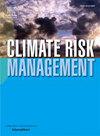Climate information services enhance farmers’ resilience to climate change: Impacts on agricultural productivity
IF 5
2区 环境科学与生态学
Q1 ENVIRONMENTAL SCIENCES
引用次数: 0
Abstract
Ethiopia is a climate “hotspot” where the variable and changing climate periodically threatens agricultural production, food security, and human well-being. Using two-rounds of Feed the Future program survey data that cover 3,799 farming households in five major regions in Ethiopia, and employing panel data estimation methods, we analyze the potential impact of weather and climate services (WCS) on agricultural productivity and farmers’ resilience in Ethiopia. We found that access to WCS increases the productivity of maize and wheat crops by 27 % and 17 %, respectively. These estimates are comparable to or higher than conventional yield-increasing production technologies such as fertilizer and improved seeds. Despite such a strong productivity effect, access to WCS is limited to only 18 % of the surveyed farmers. This study adds to the existing body of evidence on the significant positive impact of WCS, and affirms the importance of weather and climate information service products to enhance farmers’ resilience to climate risk. Further analyses are needed to estimate the value to Ethiopia’s smallholder farmers, especially those who are most vulnerable to climate-related hazards, of increasing investment in improving seasonal climate forecasts, mainstreaming weather and climate services in the agricultural extension system, including through National Framework for Climate Services (NFCS), and supporting farmer decision-making with climate-informed digital advisory tools and training.
气候信息服务提高农民对气候变化的适应能力:对农业生产力的影响
埃塞俄比亚是一个气候“热点”,多变和不断变化的气候周期性地威胁着农业生产、粮食安全和人类福祉。利用覆盖埃塞俄比亚五个主要地区3799户农户的两轮“未来粮食保障计划”调查数据,并采用面板数据估计方法,我们分析了天气和气候服务(WCS)对埃塞俄比亚农业生产力和农民抗灾能力的潜在影响。我们发现,获得WCS可使玉米和小麦的产量分别提高27%和17%。这些估计值与化肥和改良种子等传统增产生产技术相当或更高。尽管有如此强大的生产力效应,但只有18%的受访农民获得了WCS。本研究增加了WCS显著积极影响的现有证据,并肯定了天气和气候信息服务产品对提高农民对气候风险的抵御能力的重要性。需要进一步分析,以估计增加投资改善季节性气候预报,通过国家气候服务框架(NFCS)等方式将天气和气候服务纳入农业推广系统主流,并利用气候信息数字化咨询工具和培训支持农民决策,对埃塞俄比亚小农,特别是最容易受到气候相关危害影响的小农的价值。
本文章由计算机程序翻译,如有差异,请以英文原文为准。
求助全文
约1分钟内获得全文
求助全文
来源期刊

Climate Risk Management
Earth and Planetary Sciences-Atmospheric Science
CiteScore
8.20
自引率
4.50%
发文量
76
审稿时长
30 weeks
期刊介绍:
Climate Risk Management publishes original scientific contributions, state-of-the-art reviews and reports of practical experience on the use of knowledge and information regarding the consequences of climate variability and climate change in decision and policy making on climate change responses from the near- to long-term.
The concept of climate risk management refers to activities and methods that are used by individuals, organizations, and institutions to facilitate climate-resilient decision-making. Its objective is to promote sustainable development by maximizing the beneficial impacts of climate change responses and minimizing negative impacts across the full spectrum of geographies and sectors that are potentially affected by the changing climate.
 求助内容:
求助内容: 应助结果提醒方式:
应助结果提醒方式:


